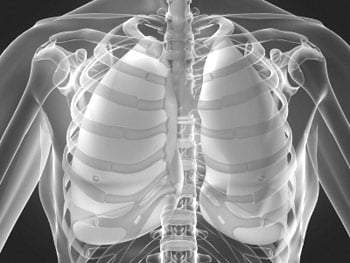Of course you don’t forget, it is automatic. We take our breathing for granted and don’t think about it. The lungs are very important; they help us bring oxygen in and release the byproduct, carbon dioxide.
We have over 300 million tiny air sacs in our lungs! Each of them is a membrane for these two gasses to pass from blood to air and vice versa. The membranes together would form a surface area of 160 square meters or 40 x 40 meters (a meter is slightly longer than a yard). That’s a ginormous membrane.
Let’s talk about lung problems.
 Altitude
Altitude
So you are in Denver or Mexico City, a mile higher than sea level, and you are more short of breath climbing stairs. If you are in Machu Picchu, about a half mile higher, you would really feel it. There is less pressure so high up, so the oxygen has more trouble being pushed into your blood across the membrane. You have to breathe faster to get the same amount of oxygen that you need than you would at sea level.
Pneumonia
This is an infection of the lung. Viruses and Pneumocystis (a fungus that attacks HIV patients) cause an inflammation of the membranes in many of the sacs so one gets short of breath since the gasses have trouble crossing that thickened membrane. Bacteria cause a little pus, or inflammation of more than just the membrane but usually in a certain zone of the lungs rather than all over so that knocks out the function of that part of the lung.
Asthma
This is an inflammation of the tubes, airways so that there is more mucus and swelling of the lining of the tubes, in addition to the muscles in the tubes become hyperactive and squeeze them down. That results in air having trouble getting out of the lungs, resulting in wheezing. This is usually from allergies to pollens, smog, other fine chemicals or particles that we inhale. An albuterol inhaler opens up the muscles and a steroid inhaler decreases the inflammation and secretions.
Smoke Damage
Whether from cigarettes, cigars, or smoke from fires, the ashes get trapped in the lungs and cause inflammation and increased mucus like in asthma. It can also cause loss of lung tissue; the air sacs are destroyed so that you have less area to exchange gas. Many people walking around with an oxygen tank and tubes up their noses have this from chronic smoking. Most of them at this stage stay home, needing oxygen to walk to the bathroom or the kitchen. Many of them die very early in life. Dying from not being able to get oxygen is horrible. Even a couple cigarettes a day cause this type of damage.
Heart Failure
When the heart is weak, for example, from pumping against untreated high blood pressure for years, the blood might back up in the lungs. The liquid may leak into the membrane so that you have a similar problem like viral pneumonia.
Diagnosis
Asking questions, examining the patient, performing lab tests and a chest X-ray is helpful to diagnose lung problems.
Ventilators
When the person tires out and can’t exchange enough gasses, they will die unless assisted by a machine. Usually we put a tube into their main airway (after making them drowsy of course) and have a machine push in oxygen and let it out. The types of pressure, volumes, and flow are scientifically matched to the disease. We usually give 100% oxygen at first and then taper down since being on that high of oxygen can be toxic to the lung—strange! Most of the time we have to sedate the patient to keep them on the ventilator since it is uncomfortable. Their hands must be tied down so they don’t rip the tube out or the deep IV lines or other catheters or devices. Also, they usually must be fed through a tube passing through the nose into the stomach.
This is acceptable to most who feel they will live through this and recover. Those who don’t have a good chance should think about this ahead of time. I have told my wife and son to not let me be a vegetable if there is poor chance of recovery to a meaningful life. I define a vegetable as one who can’t receive or give love and they are just existing, having very little pleasure in life. They are usually fed by a tube that goes through the abdominal wall and into the intestines. They must have diapers changed and be turned frequently to avoid bed sores.
If a ventilator tube is left in more than 10-14 days, then sores might result from the irritation in the throat. So we perform a tracheostomy, which is a hole in the neck that the tubing can go through. After the person is more alert there are devices that allow them to speak in spite of the unnatural way the air is routed.
Prevention
Well, this has been a happy subject! To prevent these problems, get your flu shot, don’t smoke, take care of your asthma, talk with your next of kin about what you would and wouldn’t want done if you were not thinking clearly. A car crash could happen any time and it is very frustrating for all concerned when family members say, “I don’t know what he would want in this situation.”

